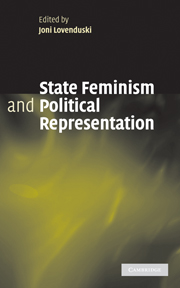Book contents
- Frontmatter
- Contents
- List of figures
- List of tables
- Notes on contributors
- Preface
- List of abbreviations
- 1 Introduction: state feminism and the political representation of women
- 2 Gendering political representation: debates and controversies in Austria
- 3 The Belgian paradox: inclusion and exclusion of gender issues
- 4 A politics for presence: state feminism, women's movements and political representation in Finland
- 5 Gendering the republican system: debates on women's political representation in France
- 6 WPAs and political representation in Germany
- 7 Gendering the debate on political representation in Italy: a difficult challenge
- 8 High tides in a low country: gendering political representation in the Netherlands
- 9 The women's movement, gender equality agencies and central-state debates on political representation in Spain
- 10 Party feminism, state feminism and women's representation in Sweden
- 11 Party government and women's representation debates: the UK
- 12 Women's policy agencies, the women's movement and representation in the USA
- 13 Conclusions: state feminism and political representation
- Appendix 1 Tables of women's representation in eleven countries
- Appendix 2 The RNGS model: summary of variable descriptors
- Index
- References
10 - Party feminism, state feminism and women's representation in Sweden
Published online by Cambridge University Press: 22 September 2009
- Frontmatter
- Contents
- List of figures
- List of tables
- Notes on contributors
- Preface
- List of abbreviations
- 1 Introduction: state feminism and the political representation of women
- 2 Gendering political representation: debates and controversies in Austria
- 3 The Belgian paradox: inclusion and exclusion of gender issues
- 4 A politics for presence: state feminism, women's movements and political representation in Finland
- 5 Gendering the republican system: debates on women's political representation in France
- 6 WPAs and political representation in Germany
- 7 Gendering the debate on political representation in Italy: a difficult challenge
- 8 High tides in a low country: gendering political representation in the Netherlands
- 9 The women's movement, gender equality agencies and central-state debates on political representation in Spain
- 10 Party feminism, state feminism and women's representation in Sweden
- 11 Party government and women's representation debates: the UK
- 12 Women's policy agencies, the women's movement and representation in the USA
- 13 Conclusions: state feminism and political representation
- Appendix 1 Tables of women's representation in eleven countries
- Appendix 2 The RNGS model: summary of variable descriptors
- Index
- References
Summary
Introduction
Issues of political representation in Sweden during the past four decades have been influenced by two processes: the modernisation of the world's second oldest written constitution adopted in 1809 and a struggle over extending democracy. Constitutional reform and enlarging democracy provided a contradictory setting – both hospitable and unfavourable – to women's demands for better political representation. Until recently feminist actors and perspectives were generally marginalised in discussions on constitutional reforms, with women at the last minute expressing apprehension that a specific reform would adversely affect their representation. By contrast, the discussion on extending democracy and promoting equality offered a discursive opportunity of crucial importance to the impressive growth of women's representation.
Besides issues of the day, aspects of the Swedish understanding of political representation have formed an auspicious environment. Historically social representation has had a strong tradition, dating from the establishment of the four estates parliament in 1435. This parliament originally rested on a broader basis than similar bodies elsewhere and survived much longer (until 1866). Social representation, combined with a constitutional provision that interested parties should be consulted in the decision-making process, and the idea of a representative bureaucracy paved the way for corporatist arrangements in policy-making and subsequently in administration. The political parties, in particular the Social Democrats, the Centre Party and the Conservatives (the Moderates since 1969), which have represented the interests of workers, farmers and business respectively, also carried on the tradition of social representation.
- Type
- Chapter
- Information
- State Feminism and Political Representation , pp. 195 - 215Publisher: Cambridge University PressPrint publication year: 2005
References
- 7
- Cited by



